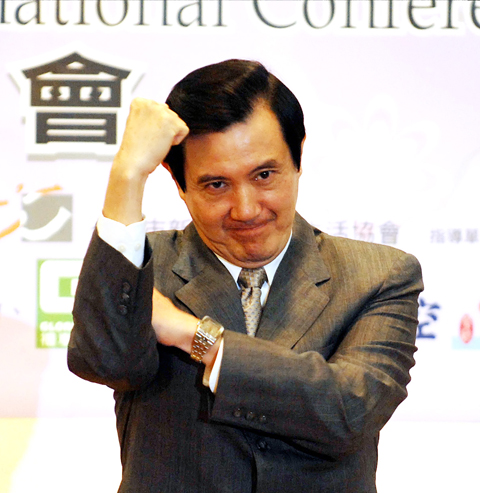Taiwanese exports plunged to a seven-year low last month, with shipments to all major trade partners except Japan suffering sizable contractions as the nation's export-dependent economy was hit hard by the global slowdown, the Ministry of Finance said yesterday.
“Custom-cleared exports fell 23.3 percent, or US$5.09 billion, to US$16.78 billion in November from a year ago,” Lin Lee-jen (林麗貞), head of the ministry's statistics department, told a media briefing yesterday afternoon.
It was the third straight month that overseas shipments contracted, posting their sharpest decline since October 2001, Lin said.

PHOTO: CNA
Similarly, imports fell 13.2 percent, or US$2.32 billion, to US$15.26 billion, the biggest drop since March 2002, leaving a trade surplus of US$1.52 billion, the ministry report said.
Lin pinned the blame of falling trade on the global slowdown that is plaguing the US and Europe and weakening demand for Taiwanese consumer electronic and communications products.
Exports to China, including Hong Kong, which accounted for about 40 percent of the nation's shipments, contracted by a record 38.5 percent, or US$3.53 billion, to US$5.63 billion from last year, the report showed.
Shipments to the US, the nation's second-largest trade partner, fell 14.2 percent, or US$390 million, to US$2.38 billion, the report said.
Shipments to Europe and emerging markets in Asia decreased 9.8 percent and 19.4 percent to US$2.22 billion and US$2.6 billion respectively, the report showed.
Exports to Japan bucked the trend, gaining 19.2 percent year-on-year last month to US$1.5 billion, Lin said, attributing the increase to a stronger yen.
Lin said the figures were disappointing and the trend would persist in the months ahead. The Directorate-General of Budget, Accounting and Statistics forecast on Nov. 20 that exports would likely decline in the first three quarters of next year.
Cumulative exports in the first 11 months of this year stood at US$242.02 billion, up 8.4 percent from last year, while imports grew 15.7 percent to US$229.08 billion, leaving a trade surplus of US$12.94 billion, down 48.7 percent from a year ago, the report showed.
Cheng Cheng-mount (鄭貞茂), chief economist at Citigroup Inc Taiwan, said the latest export data was worse than expected and would drag down the nation's economic showing in the last quarter.
“Citigroup expected exports to drop 9.8 percent and imports to fall 9 percent last month,” Cheng said by telephone. “The outcome spells greater downside risks for Taiwan, with the outlook more bearish in the months to come.”
To halt the trend, Cheng said the central bank could cut interest rates by 50 basis points and adopt other loose monetary measures in its board meeting on Thursday.
Tony Phoo (符銘財), chief economist of Standard Chartered Bank, shared the pessimistic sentiment, saying it would be difficult for export orders to pick up in the first half of next year.
Phoo also voiced concern about the weakening trade surplus and shrinking shipments to China.
“The trade surplus for the first 11 months is too low,” Phoo said by telephone. “I'm surprised it failed to exceed US$2 billion.”
Phoo expects the central bank to cut interest rates by 25 basis points to stimulate the economy.

WAITING GAME: The US has so far only offered a ‘best rate tariff,’ which officials assume is about 15 percent, the same as Japan, a person familiar with the matter said Taiwan and the US have completed “technical consultations” regarding tariffs and a finalized rate is expected to be released soon, Executive Yuan spokeswoman Michelle Lee (李慧芝) told a news conference yesterday, as a 90-day pause on US President Donald Trump’s “reciprocal” tariffs is set to expire today. The two countries have reached a “certain degree of consensus” on issues such as tariffs, nontariff trade barriers, trade facilitation, supply chain resilience and economic security, Lee said. They also discussed opportunities for cooperation, investment and procurement, she said. A joint statement is still being negotiated and would be released once the US government has made

Authorities have detained three former Taiwan Semiconductor Manufacturing Co (TMSC, 台積電) employees on suspicion of compromising classified technology used in making 2-nanometer chips, the Taiwan High Prosecutors’ Office said yesterday. Prosecutors are holding a former TSMC engineer surnamed Chen (陳) and two recently sacked TSMC engineers, including one person surnamed Wu (吳) in detention with restricted communication, following an investigation launched on July 25, a statement said. The announcement came a day after Nikkei Asia reported on the technology theft in an exclusive story, saying TSMC had fired two workers for contravening data rules on advanced chipmaking technology. Two-nanometer wafers are the most

NEW GEAR: On top of the new Tien Kung IV air defense missiles, the military is expected to place orders for a new combat vehicle next year for delivery in 2028 Mass production of Tien Kung IV (Sky Bow IV) missiles is expected to start next year, with plans to order 122 pods, the Ministry of National Defense’s (MND) latest list of regulated military material showed. The document said that the armed forces would obtain 46 pods of the air defense missiles next year and 76 pods the year after that. The Tien Kung IV is designed to intercept cruise missiles and ballistic missiles to an altitude of 70km, compared with the 60km maximum altitude achieved by the Missile Segment Enhancement variant of PAC-3 systems. A defense source said yesterday that the number of

Taiwanese exports to the US are to be subject to a 20 percent tariff starting on Thursday next week, according to an executive order signed by US President Donald Trump yesterday. The 20 percent levy was the same as the tariffs imposed on Vietnam, Sri Lanka and Bangladesh by Trump. It was higher than the tariffs imposed on Japan, South Korea and the EU (15 percent), as well as those on the Philippines (19 percent). A Taiwan official with knowledge of the matter said it is a "phased" tariff rate, and negotiations would continue. "Once negotiations conclude, Taiwan will obtain a better